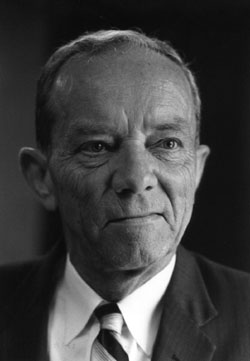Foy Kohler
( spook, diplomat) | ||||||||||||||||||||||||||||||
|---|---|---|---|---|---|---|---|---|---|---|---|---|---|---|---|---|---|---|---|---|---|---|---|---|---|---|---|---|---|---|
 | ||||||||||||||||||||||||||||||
| Born | February 15, 1908 Oakwood, Ohio | |||||||||||||||||||||||||||||
| Died | December 23, 1990 (Age 82) Jupiter, Florida | |||||||||||||||||||||||||||||
| Alma mater | • University of Toledo • Ohio State University • Cornell University | |||||||||||||||||||||||||||||
| Spouse | Phyllis Penn | |||||||||||||||||||||||||||||
| Member of | Committee on the Present Danger, Council on Foreign Relations/Historical Members, Team B | |||||||||||||||||||||||||||||
US diplomat and cold warrior. Ambassador to the Soviet Union, Assistant Secretary of State for European and Eurasian Affairs, Committee on the Present Danger, Team B, Council on Foreign Relations.
| ||||||||||||||||||||||||||||||
Foy David Kohler was an American diplomat who was the United States Ambassador to the Soviet Union during the Cuban Missile Crisis. A Cold Warrior, he was director of the CIA's Voice of America, a member of the Committee on the Present Danger and George H. W. Bush's Team B. He was also a member of the Council on Foreign Relations.
Early life
Kohler was born in Oakwood, Ohio but the family moved to Toledo when he was young. He attended the University of Toledo and Ohio State University, where he graduated in 1931 with a BS in foreign studies.[1]
He entered the Foreign Service and worked in Windsor (Canada), Belgrade (Yugoslavia), and Bucharest (Romania). He married Phyllis Penn of Greensboro, North Carolina in Bucharest in 1935.[1] Later they worked in Athens (Greece), Cairo (Egypt), Vietnam, and Bolivia.[2]
At the end of World War II, Kohler worked as the assistant chief of the Foreign Service's Division of Near Eastern Affairs.[3]
Kohler studied Russian at Cornell University in 1946 and then had his first tour in Moscow from 1947-49 working for Ambassador Walter Bedell Smith.[1]
Ambassador to the Soviet Union
He was Director of Voice of America 1949-52[4]. In 1951, his career was nearly derailed when he and his wife were in a traffic accident in Washington. He was found to be carrying classified documents that he had removed from the State Department against regulations. He was suspended for 30 days, then sent to Turkey.
From 1953 to 1956, he was counselor of the U.S. Embassy in Ankara, Turkey. He also worked on the State Department's Policy Planning staff and with the International Cooperation Administration, a predecessor of the Agency for International Development. In 1959, he became Assistant Secretary of State for European and Eurasian Affairs, an important deep state position.[5]
In September 1962 President John F. Kennedy named Kohler Ambassador to the Soviet Union. He and his wife moved to Spaso House, the U.S. Ambassador’s residence in Moscow, and began a complete remodeling of the mansion.[1]
In just a few weeks the Cuban Missile Crisis began and Kohler found himself engaged in defusing a serious international crisis. The Americans had found that the Soviets were placing nuclear missiles in Cuba. Soviet Premier Khrushchev was not well acquainted with Kohler, and what little Khrushchev did know about him he disliked. As a result, there was little that Kohler could have done to influence Khrushchev one way or another. Even so, Kohler proved useful by efficiently transmitting important messages between the White House and the Kremlin.[3] After two weeks of tension over the risk of escalation, Nikita Khrushchev agreed to remove the missiles.
The experience convinced both sides of the need for better communications. On June 20, 1963, the two countries agreed to set up a continuous connection over a secure transatlantic cable, as a "hot line" for use in times of emergency. [6]
On August 5, 1963, the Limited Test Ban Treaty, which banned nuclear testing in the atmosphere, under water, or outer space, was signed in Moscow.[7] This was to be the first in a series of arms control agreements between the superpowers.
On March 6, 1967, Kohler received word that Svetlana Alliluyeva, the daughter of former Soviet leader Joseph Stalin had decided to defect to the U.S. in New Delhi. He had the responsibility to inform the Soviets via their Ambassador to the U.S., Anatoly Dobrynin.[1]
Kohler retired from the foreign service in 1967 with the personal rank of Career Ambassador.
After government service
The Kohlers moved to Florida and he became a professor of international studies at the Center for Advanced International Studies of the University of Miami.
He died December 23, 1990.
References
- ↑ Jump up to: a b c d e Kohart, Georgia, Foy David Kohler Obituary Archived 2012-02-08 at the Wayback Machine. Defiance Ohio Crescent-News January 28, 2001
- ↑ U.S. Ministers and Ambassadors to Russia Archived October 6, 2007, at the Wayback Machine., American Embassy, Moscow
- ↑ Jump up to: a b Mayers, David (1995). The Ambassadors and America's Soviet Policy. New York and Oxford: Oxford University Press. p. 213. ISBN 0195115767.
- ↑ https://www.insidevoa.com/a/4497944.html
- ↑ https://www.washingtonpost.com/archive/local/1990/12/26/foy-d-kohler-dies/4c9e510a-4367-4e4b-99e3-2d4fae69e502/
- ↑ Hot Line Agreement (1963)
- ↑ Limited Test Ban Treaty (1963)